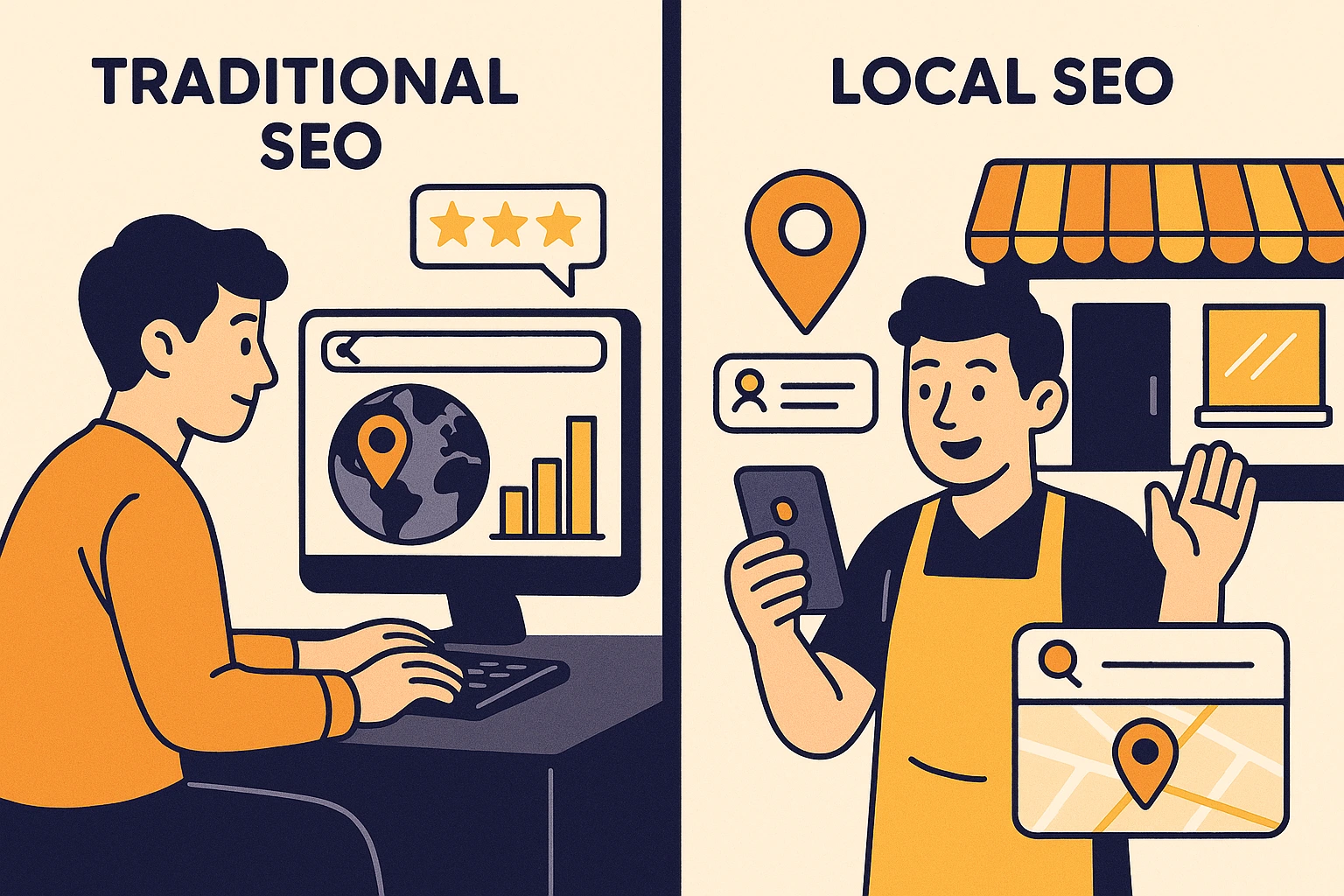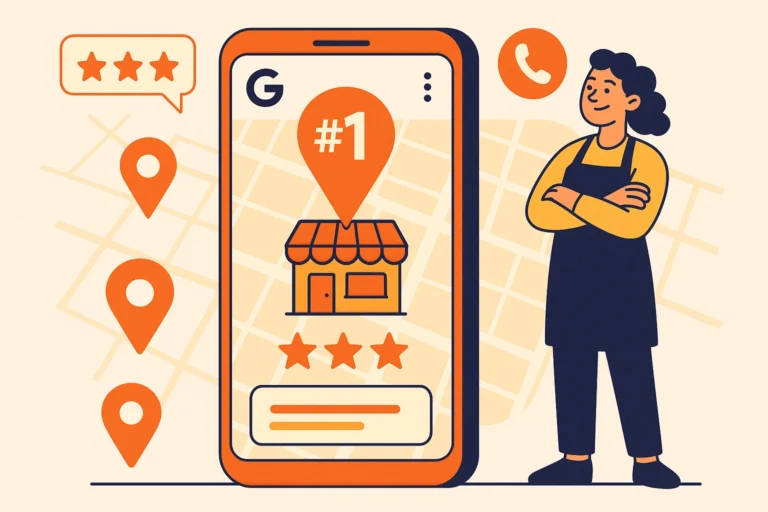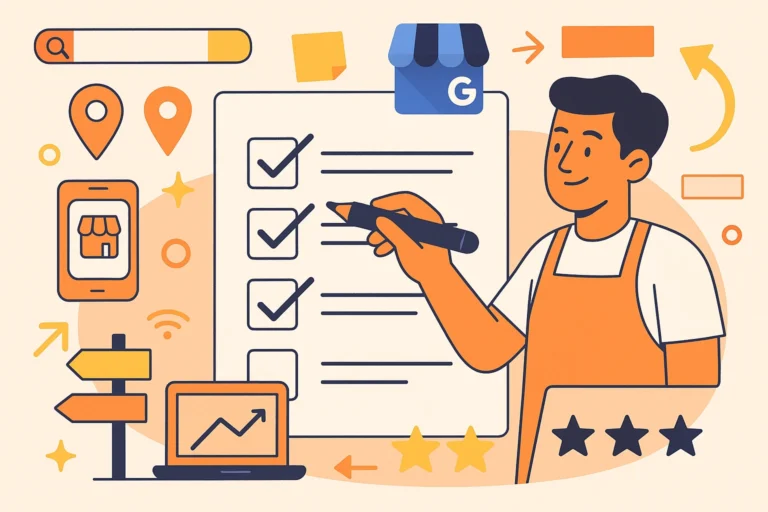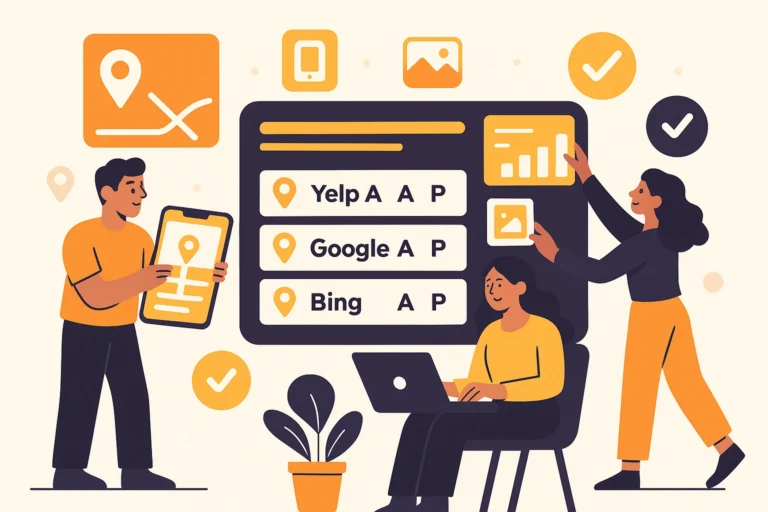Introduction: Not All SEO is Created Equal
If you’re a small business owner trying to get found online, you’ve likely heard about the power of SEO. But did you know there are two very different types of SEO—and one is far more relevant to local businesses?
It’s the classic comparison: Local SEO vs Traditional SEO.
While both aim to boost visibility in search engine results, the approach, intent, and impact vary widely. And choosing the wrong one could mean wasting time and money on strategies that simply don’t suit your goals.
In this blog, we’ll break down the key differences, help you understand what truly matters for your local business, and show you how to win the visibility game—without the confusion.
What is Traditional SEO?
Traditional (or organic) SEO is the practice of improving a website’s visibility on a national or global level. It’s what large brands and e-commerce sites use to rank for competitive keywords like:
- “best laptops 2025”
- “digital marketing services”
- “online workout programs”
These searches are not location-specific, and the focus is on driving traffic from anywhere.
Key features of Traditional SEO include:
- Targeting broad or high-volume keywords
- Optimizing blog content and site architecture
- Building backlinks from high-authority sites
- Enhancing site speed, mobile usability, and user experience
- Long-term national ranking goals
What is Local SEO?
Local SEO is designed specifically for businesses that serve customers in a particular city, region, or neighborhood.
It focuses on improving your visibility in local search results, especially in Google’s Map Pack (also known as the 3-Pack), for keywords like:
- “dentist near me”
- “best cafe in Brooklyn”
- “AC repair in Jaipur”
Instead of chasing global rankings, Local SEO aims to make your business show up when nearby customers are looking for services you offer.
Key features of Local SEO include:
- Optimizing your Google Business Profile
- Getting listed on local directories
- Using location-specific keywords
- Managing reviews and ratings
- Building local citations
- Geo-tagging content and images
Key Differences: Local SEO vs Traditional SEO
Let’s break it down clearly:
| Feature | Traditional SEO | Local SEO |
|---|---|---|
| Target Audience | National/Global | Local/Regional |
| Search Intent | Informational/Transactional | Navigational/Transactional |
| Focus Keywords | Broad, generic keywords | Keywords with location intent |
| Google Visibility | Organic results | Map Pack + Organic |
| Optimization Tools | On-page SEO, backlinks, blogs | Google Business Profile, citations, reviews |
| Conversion Goal | Leads, traffic, sales | Walk-ins, calls, local leads |
| Best For | E-commerce, SaaS, blogs | Local shops, restaurants, services |
Why Local SEO Matters More for Small Businesses
If you’re running a bakery, law firm, fitness studio, salon, or plumbing service—your primary goal isn’t to attract people across the country. It’s to get found by people nearby who are ready to buy.
Here’s why Local SEO beats Traditional SEO for small businesses:
✅ 1. High Purchase Intent
Local searches often come from people ready to act.
Example: Someone searching for “emergency electrician near me” isn’t researching—they’re looking to book now.
✅ 2. Google Prioritizes Local
Google’s algorithm favors relevance + proximity + prominence. That means if your business is close to the searcher and your local profile is optimized, you’re more likely to show up—even above national brands.
✅ 3. Mobile + Voice Search Growth
With 80%+ of local searches coming from smartphones or voice assistants like Siri and Google Assistant, location-based SEO is more important than ever.
Searches like:
- “Where’s the closest pet store?”
- “Pizza near me open now”
Only Local SEO can put you in front of those queries.
✅ 4. Cost-Effective for Local Budgets
Traditional SEO often requires hefty investment in content marketing and link building. Local SEO is more affordable and often delivers faster ROI—especially for small teams with limited budgets.
✅ 5. Builds Real-World Reputation
Local SEO isn’t just about rankings. It involves managing your reviews, building a positive reputation, and creating trust with your community. That brings both digital and foot traffic to your door.
What Do Local Businesses Actually Need in 2025?
If you’re a service provider, local shop, or brick-and-mortar business, here’s what matters most:
📍 Optimize Your Google Business Profile
This is your local homepage. Ensure:
- Accurate business hours
- Category + service selection
- High-quality images
- Keyword-rich description
- Regular updates & posts
📞 Collect and Respond to Reviews
More reviews = more trust = higher local rankings.
Encourage happy customers to leave 5-star reviews and always respond, especially to the negative ones.
🌐 Consistent Local Citations
Submit your business info (Name, Address, Phone) to trusted directories like Yelp, Bing, and Facebook. NAP consistency is key.
📸 Geo-Tagged Content on Website & Social
Use photos from your real location, add local events, or feature customer stories from your city. This adds authenticity and SEO relevance.
🔑 Use Location-Based Keywords
Instead of “best gym,” target “best gym in Jaipur” or “personal trainer in Austin.” These drive hyper-targeted, high-converting traffic.
Can You Combine Both Local and Traditional SEO?
Absolutely! If you run a multi-location business, offer online consultations, or ship products, you can benefit from a hybrid approach.
But your core strategy should still start with Local SEO—especially if in-person interaction or local service is your primary business model.
Final Thoughts: SEO Success Starts Locally
In 2025, it’s no longer enough to “just do SEO.” You have to choose the right type of SEO for your goals—and for local businesses, that choice is clear.
Local SEO is faster, more focused, more cost-effective, and designed specifically to help small businesses grow in their neighborhoods.
So before investing thousands in content, backlinks, or national campaigns—ask yourself:
“Do I want to be found globally… or by the customers right down the street?”
For most small businesses, the answer is obvious.
👉 Ready to boost your local presence? Get a Quote or explore our Pricing Plans and let LocalSeoWise build a customized local SEO strategy that gets you seen, visited, and trusted in your area.




